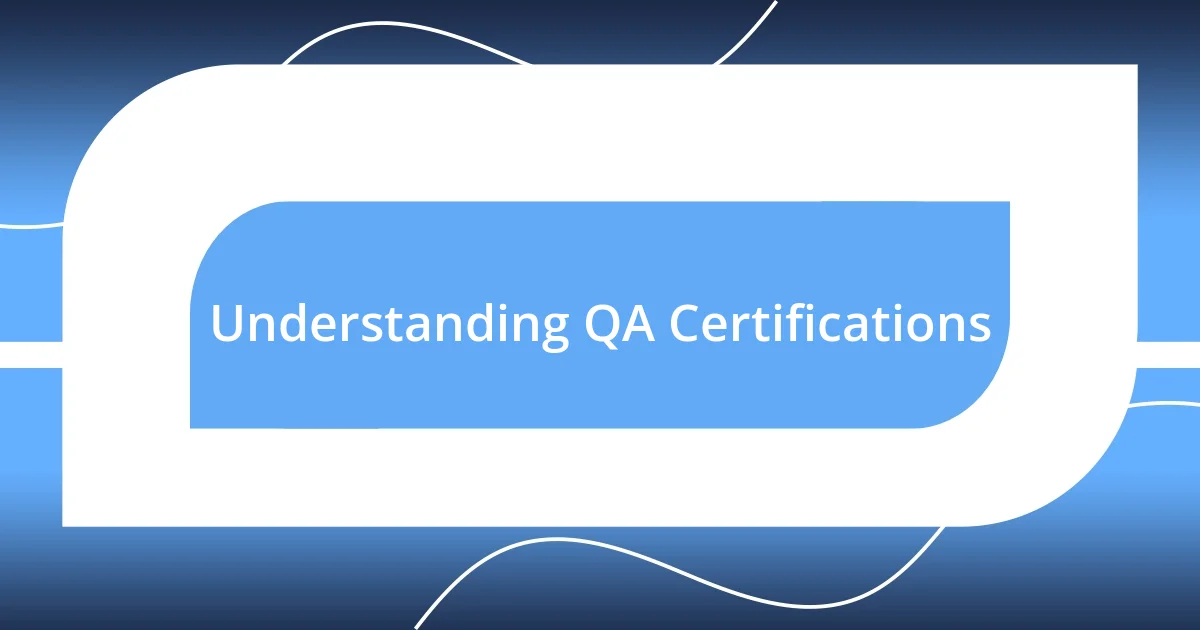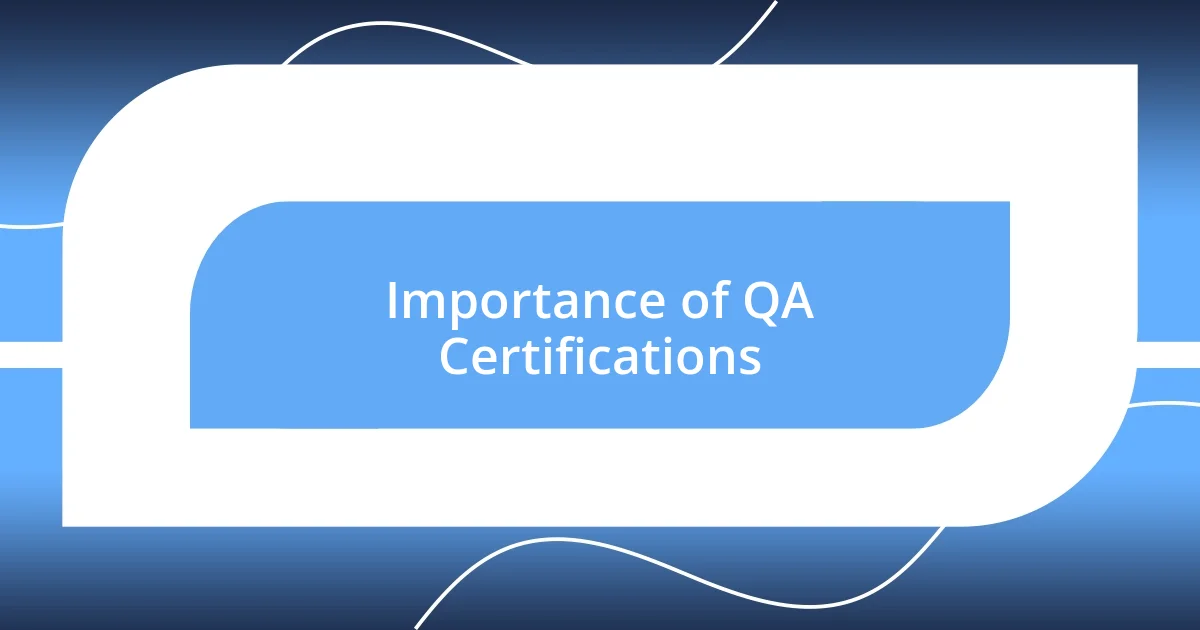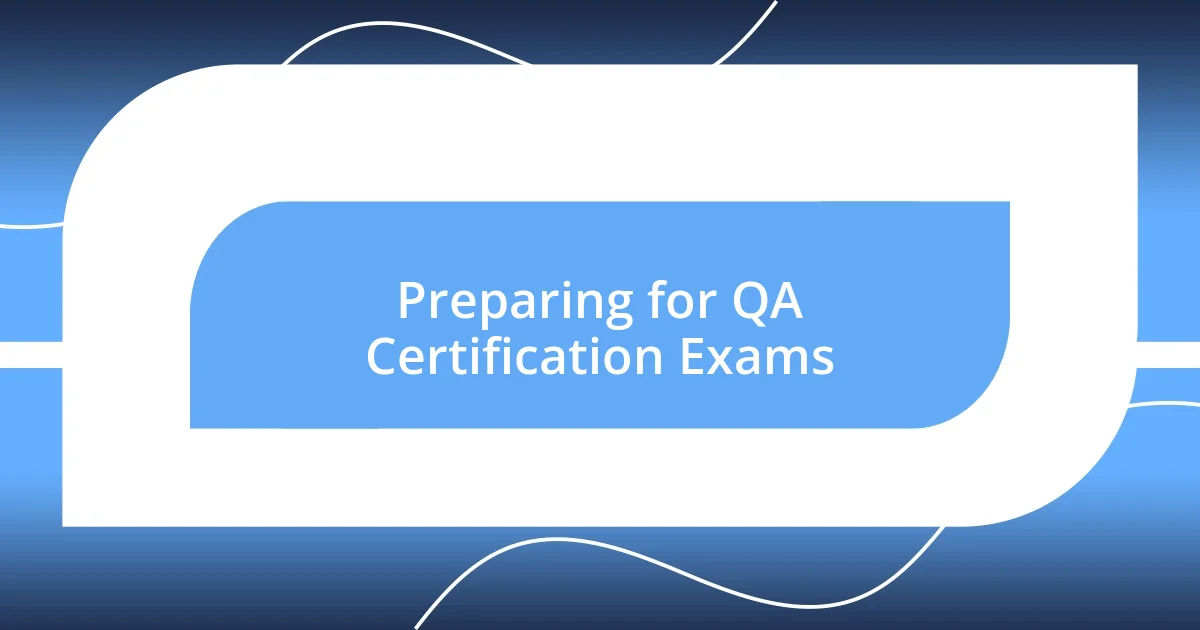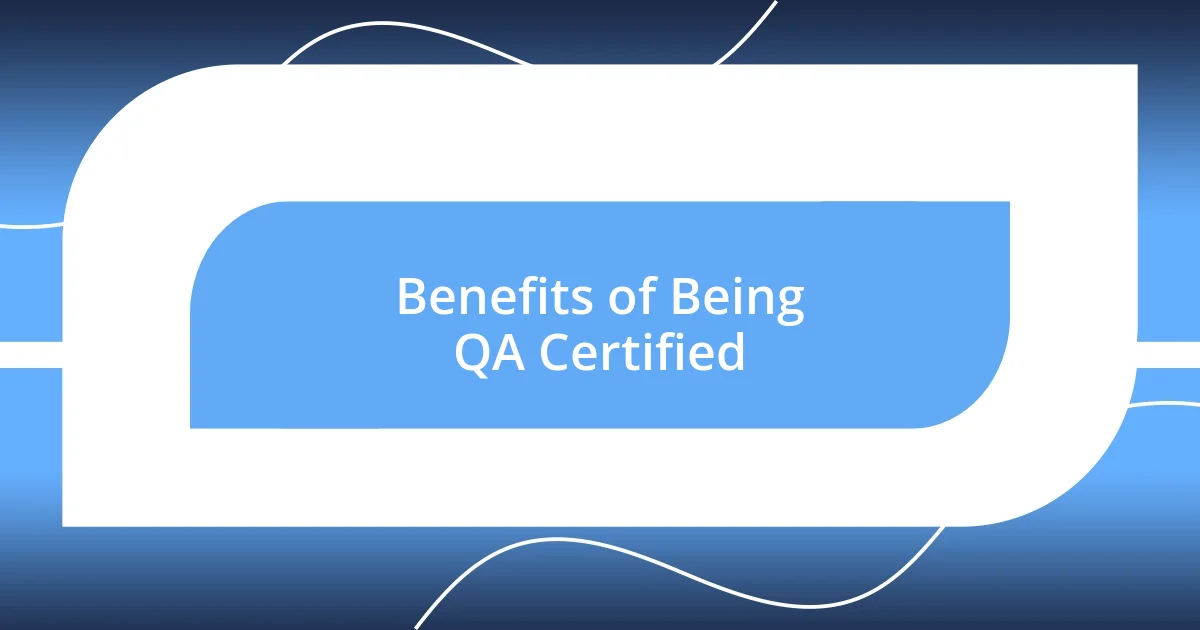Key takeaways:
- QA certifications enhance job prospects and validate skills, making candidates more competitive in the job market.
- Popular certifications like ISTQB, CST, and CAT cater to different niches, emphasizing fundamental testing, practical application, and automation, respectively.
- Preparation strategies such as mock tests, study groups, and goal-setting significantly improve confidence and understanding for certification exams.

Understanding QA Certifications
QA certifications can be a bit overwhelming at first, can’t they? When I was starting out in the field, I remember poring over the vast number of options available. Each certification promised certain skills or knowledge, but it was tough to choose the right one that aligned with my career goals.
One of the key aspects I’ve learned about these certifications is that they often focus on different methodologies and tools. For example, some certifications delve deep into manual testing, while others emphasize automation. As I explored these options, I found myself reflecting on what skills would not only enhance my resume but also make me more effective in my day-to-day work.
Moreover, earning a QA certification can sometimes feel like a rite of passage in the tech world. I still vividly recall the rush of joy I felt after passing my first exam. That sense of accomplishment not only boosted my confidence but also ignited a hunger for continuous learning in the QA landscape. Isn’t it fascinating how these pieces of paper can open doors and elevate our careers?

Importance of QA Certifications
QA certifications play a critical role in setting professionals apart in a competitive job market. I remember the first time I walked into an interview with my certification proudly displayed on my resume. It not only served as proof of my skills but also acted as a conversation starter, allowing me to showcase my knowledge and passion for quality assurance in a tangible way. It’s remarkable how these credentials communicate commitment and expertise.
Here are some key reasons why QA certifications matter:
- Validation of Skills: They demonstrate your knowledge and proficiency in QA principles and practices.
- Career Advancement: Many employers prioritize candidates with certifications, often leading to better job opportunities and higher salaries.
- Networking Opportunities: Earning a certification can connect you with a community of professionals, paving the way for collaboration and mentorship.
- Staying Current: Certifications often require ongoing education, ensuring you stay updated with the latest trends and technologies in the QA landscape.
- Enhanced Credibility: They foster trust among clients and team members, assuring them that you’re equipped to handle quality assurance challenges effectively.

Popular QA Certifications Explained
QA certifications vary widely, each catering to specific niches within the field. For instance, the ISTQB (International Software Testing Qualifications Board) Certification is globally recognized and primarily focuses on fundamental testing concepts. It was one of the first certifications I pursued, and what struck me was how it laid a solid foundation in testing principles that I still refer back to.
Meanwhile, the Certified Software Tester (CST) certification delves deeper into the practicalities of software testing, emphasizing real-world scenarios over strict theoretical knowledge. When I opted for this certification, it was like transitioning from a classroom to a workshop. I found the hands-on approach not only more engaging but also significantly improved my troubleshooting skills.
If you’re contemplating certifications, consider the Automation Testing certifications as well, such as the Certified Agile Tester (CAT). During my journey, I realized the importance of automation in our evolving tech landscape. This certification helped me embrace agile methodologies, and it truly transformed my approach to QA processes.
| Certification | Focus Area |
|---|---|
| ISTQB | Fundamental Testing Concepts |
| CST | Practical Software Testing |
| CAT | Automation and Agile Methodologies |

Preparing for QA Certification Exams
Preparing for QA certification exams can feel overwhelming, but breaking it down into manageable steps makes a world of difference. I remember graphing my study schedule; it helped me visualize my progress and motivated me to tackle difficult subjects one at a time. Setting specific goals gave me a clear direction, so I wasn’t just studying without purpose.
It’s essential to immerse yourself in practical scenarios, as theory alone won’t cut it. I often created mock tests, resembling the real exam format, which boosted my confidence and helped identify weak spots. Have you ever had a moment of realization about a subject you thought you understood, only to discover significant gaps? Trust me, those mock tests can be eye-openers.
Lastly, don’t underestimate the power of a study group. I joined one during my preparation, and the exchange of ideas was invaluable. In those sessions, we would tackle challenging concepts together, and I found that teaching others solidified my own understanding. Plus, the support and camaraderie made the journey more enjoyable – who doesn’t appreciate a little encouragement along the way?

Benefits of Being QA Certified
Being QA certified brings a wealth of advantages that often extend beyond just enhancing your resume. Personally, I’ve noticed that obtaining certifications boosted my confidence significantly. When I walked into interviews with those credentials, I felt a sense of pride, knowing I had validated my skills in a concrete way. Have you ever felt that surge of confidence when showcasing an accomplishment? It’s empowering.
Another notable benefit is the networking opportunities that come with certification. Through my experience with these programs, I met fellow QA professionals who shared insights that reshaped my understanding of best practices. Suddenly, I became part of a community where ideas flowed and collaboration thrived. Isn’t it fascinating how a piece of paper can open doors to such rich connections?
Lastly, being certified can lead to better job prospects and potentially higher salaries. I recall a conversation with a colleague who landed a role specifically because of their certification. It’s like having a secret weapon in a competitive job market. Have you considered how these additional qualifications might impact your career trajectory? Establishing credibility in QA is invaluable, and certifications can truly set you apart.

Career Opportunities with QA Certifications
Obtaining QA certifications can drastically widen your career opportunities. I remember attending a job fair and realizing that many employers were specifically looking for certified QA professionals. It was eye-opening to see how my certification immediately distinguished me from countless other candidates. Have you ever walked into a situation feeling equipped with unique knowledge that others lack? That’s how I felt in that moment.
Moreover, possessing these credentials often opens the door to roles that might have seemed out of reach. For instance, after I became certified, I was approached for a lead QA position that required skills in automated testing—skills I had developed during my preparation journey. It made me think about how certifications can act as stepping stones to roles that nurture your career aspirations. Why might someone hesitate to pursue such risk-free growth opportunities?
Lastly, I found that QA certifications are not just beneficial for job hunting; they also allow you to transition into different industries. When I decided to pivot from healthcare IT to the finance sector, my certification was the golden ticket. It provided credibility in a new field where I was otherwise considered inexperienced. Have you ever thought about how your skills can translate across industries? It’s empowering to know that your certification can pave the way for exploring new horizons.












